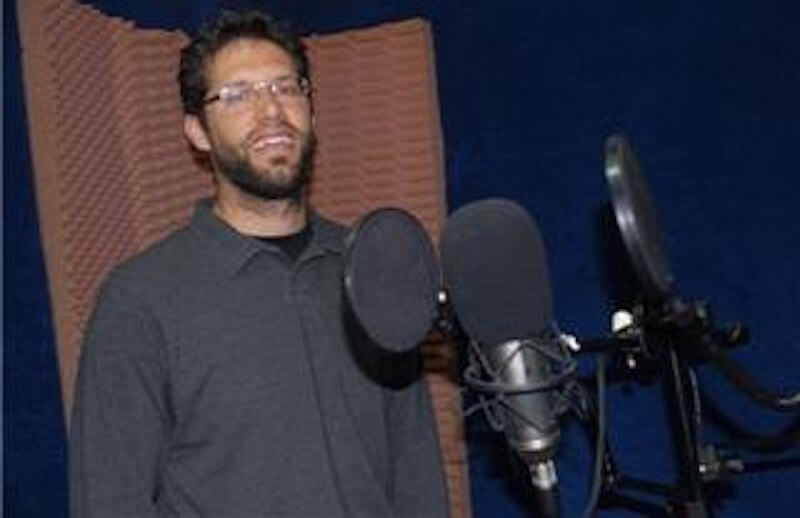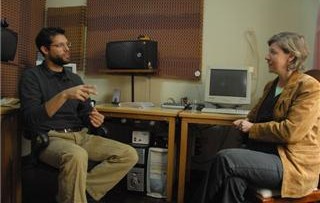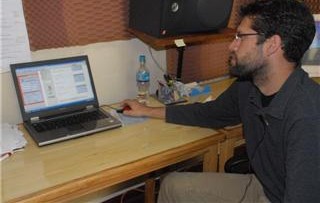
A couple of weeks ago, Claudiaexpat and I were fortunate enough to meet Santiago, a young Spaniard who works in Lima on a very innovative project. As he and his project will soon be moving to Quito, Ecuador, Claudia had arranged a meeting so as not to forego the opportunity to find out more about his important and fascinating work with an NGO called “Radialistas”. A photographer friend of Claudia’s, Luca Bonacini also accompanied us (and we thank him for the lovely photographs in this article).
Santiago met us in the studio where the team of Radialistas work daily to promote communication through democratic, free, accessible radio centring on the important themes of human rights, the gender perspective, race and sexuality.
Naturally, the first thing we asked was how Santiago came to participate in a project so important and stimulating. He was born in Spain, and throughout his studies he always thought that one day he would work in Latin America, ambitions which were also fuelled by stories of a missionary uncle who lived in Cuba. The opportunity arose when the school where he was teaching offered a chance for him to work for a year in Venezuela, where they were financing a radio station in the Venezuelan Amazon. In June of 1999, Santiago went to Venezuela for a year as a volunteer.
“For me it was very interesting”, he tells us, “because it was to try to implement a radio station from nothing, from the installation of equipment to the work of the building infrastructure, training of people, giving courses, obtaining a licence etc.
From there we started to work with a network of indigenous communication across all of Amazonia, a territory of nearly 200,000 square kilometres and with 80,000 inhabitants, lost people with no means of communication. With the support of Telefonica, they were able to implement a wonderful project, to give people the chance to communicate by means of radio, sending news for example on health issues, then the isolation and distance between towns at times contributing to an exacerbation of problems, like in the case of an epidemic of malaria which needed very rapid intervention, whilst the population still have to row to reach the nearest health post – in some cases a three day journey. It is the paradox of a country with so much wealth and yet with areas where the indigenous population is completely isolated.”
At the end of his first year Santiago returned to Spain, but was invited back to Venezuela to continue his work. He originally intended to do just one more year, but he eventually stayed five more very interesting years which coincided with the start of the Hugo Chavez period:
“They were five very enjoyable and productive years, but there came a moment when I saw the need to leave. One feels a foreigner everywhere, in spite of always trying to integrate. That, and the fact that at any given moment it is the local people who have to take over the project in the end and give it a regional touch, because as much as one tries to ‘interculturalize’ these projects, one always ends up imposing ones own way of doing things. The most important thing is that the project is on the go and is working as understood by all concerned.”
Yet again, the opportunity for change came quickly. Santiago was travelling to Costa Rica to participate in a radio communication congress for a Culture of Peace organised by UNESCO, and there he met José Ignacio, a Cuban already working on a project supplying texts for radio, with the idea that each radio station in Latin America could have texts downloaded and read on his programmes. José Ignacio had realised that radio stations with scant resources could not record text, as they were short of time/personnel. So he proposed to put texts and recordings on the web, so that people would only have to download them to broadcast them.
We ask Santiago how Radialistas works:
“José Ignacio and his companion, Tachi had worked for some years in Quito with AMRAC, The World Association of Community Networks.
Having experienced a little of the world of radio they realised that in the information niche and alternative communication many organisation concentrate on news, but very few dealt with subjects such as human rights, gender, solidarity, education. There was also no one doing dramatic productions – everything was just information. Then the idea developed to create this niche and contribute something.
At first they worked with small radio dramas of 3 or 4 minutes, sending texts to the web. The subjects treated were the eradication of poverty, fair trade and with great emphasis on the topics of gender, equality, equity, sexual education, non-sexist language, war and peace, human rights etc. A network of subscribers was formed, the majority of whom were radio people, organisations, communications, and this network sent out a daily drama, also published on the web. The idea was that everyone could download the dialogue and change or adapt it to their own circumstances. Now we also put it on the web on an audio, and the process is the same. They can download the audio and use it however they like.”
In fact, many radio stations across Latin America use it a lot. A quick glance at the website Radialistas Apasionadas y Apasionados, (www.radialistas.net) is enough to realise that the range of subjects is quite vast. Santiago tells us that what clicks most with people are the dramatisations; that’s to say a “spot” in which actors speak on various topics dramatising the situations. And that can be used perfectly for example in the struggle against HIV/Aids; a “spot” of 15 seconds about two kids who sleep together for the first time explaining the risks they may run is likely to be much more effective than mere images.
One of the most remarkable things about the project is the spontaneous and totally unique ways in which other people use the radioclips, far removed from their original intention. For example, a language school in Australia wrote to them to explain they had downloaded some radioclips, burned them onto a CD, and printed them into a Spanish language learning book. They had made use of a Radialistas interview with a Quechua woman to give an insight into the customs and Inca roots of Peruvian culture. It is very interesting to see how people in different parts of the world interpret, apply and use the material provided on the Network.
The possibilities really are endless, as Santiago tells us:
“Tachi, a partner in the radio is deeply involved in a project called ‘Women in Conflict’. It is a series of 100 case studies of women who are involved in some form of conflict. The format used is to narrate it like a story. The first chapter lasts 3 or 4 minutes and cuts off at the moment of the solution. Later, they present three different solutions. The idea is to provide the 4 audios (story and 3 solutions), give them to various radio stations, (trying to unite themes of the problems the women face), starting to transmit on Monday, to finish on Thursday with the 3rd solution and open it up for debate on Friday. The themes are infinite: maltreatment, discrimination, violence etc – all based on a dramatised story.”
The work of Radialistas is huge in scope and we wondered how such a small team manages to cope (you can meet them on the website here: https://www.radialistas.net/sobre-radialistas/quienes-somos). To further compound the mystery, Santiago tells us about a parallel project:
“This project began with 3 reflections: 1st, our production rate is insufficient: 2nd, there are many radio series made in the ‘70s, ‘80s and ‘90s that still have validity, yet are lost in many radio station collections and 3rd, other people are producing material but not sharing it. They do spots, campaigns etc, but they only pass through their own radio stations and die there.
Then in 2004, at a meeting of radio stations in Ecuador we started to ask ourselves why we didn’t use the internet to share all that, or to mount an enormous interchange portal of audios which people could enter, input their audios, and whoever wanted to could download and use it. With a little contribution from UNESCO towards the technical part and the design of the site, the portal was launched a year ago: called www.radioteca.net, it works simply as a portal for interchange of radio productions. Anyone who wants to share a radio clip uploads it and leaves it at the disposal of everyone. Radioteca actually has around 3,700 audios, divided into subjects which can be located very easily. What is nice is that people send material in all languages – there are many in Quechua and Aymara. There are only 3 requirements for the sent audios to be approved: the sound quality is good, that they are not perishable productions (e.g. daily news items) and lastly that they do not contain xenophobic, racist or homophobic material.”
When asked about the future for Radialistas, Santiago informed us that the station is returning to its birthplace, Quito in December of this year, which represents a more appropriate base for what is essentially one of the main strengths of the project, namely training.
It was great for us to have the opportunity to meet Santiago and the rest of the team, and having visited the location where it all comes together. We wish the project a great future and pass on luck and good wishes to everyone who works there.







